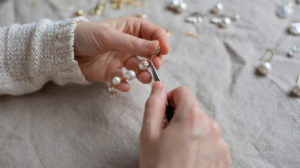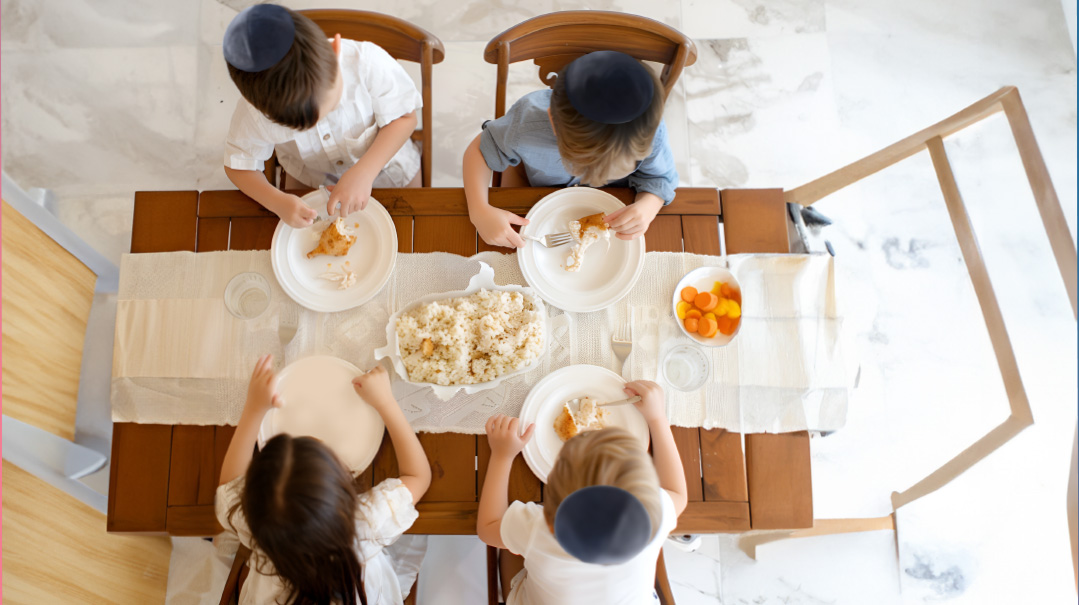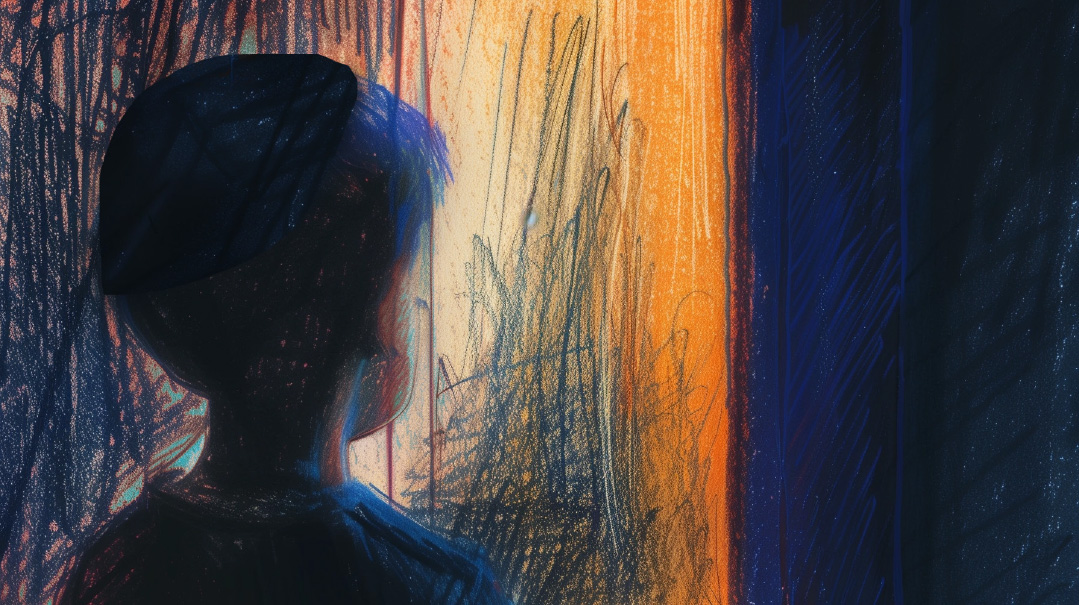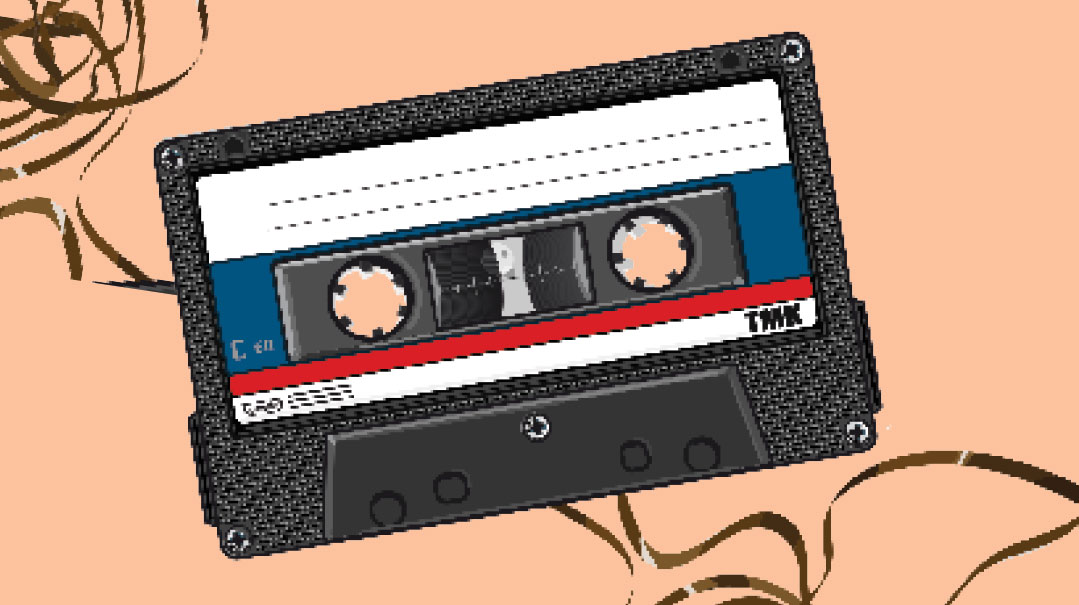We Interrupt This Lifetime
| November 25, 2020It had been 24 years of what-ifs
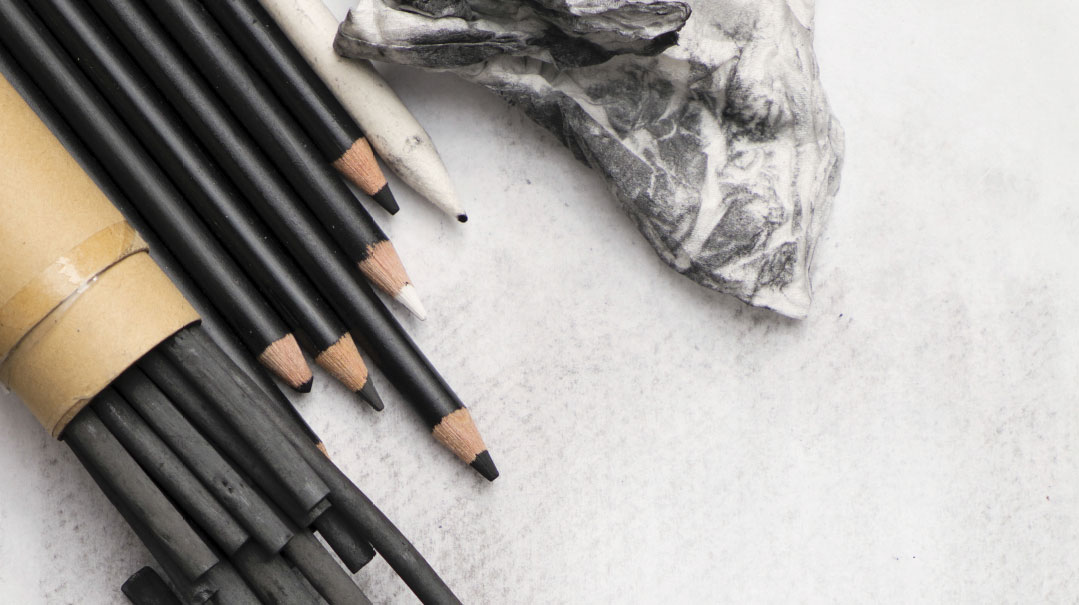
"Aaarghhh.”
It’s only soap! Rochel reminds herself as she drops into a chair at the dining room table. She’s still holding the bottle of liquid soap, still twisting the top of the pump in furious circles until it comes off in her hand.
Mordche comes in. He’s not wearing shoes and his white shirt has that lived-in look of his mid-morning quarantine nap. “Rochel, what’s wrong?”
She shoves the beheaded soap bottle toward him and opens her palm to show him the flimsy top.
He leans closer to her. “The soap bottle broke? That’s why you’re upset?”
“No. Yes. I mean, it’s nothing.”
She runs her thumb along the surface of the broken plastic. Colorless bumps. An arrow? The word “open”? Even with her reading glasses, she can’t tell. Why are the details on packaging so hard to make out? Are all the manufacturers young?
Pre-coronavirus, she’d gone to the dollar store and bought a few magnifying glasses. She’d placed them in strategic spots around the house — bedroom, kitchen, bathroom. But her young grandsons — in the halcyon days when they’d chased each other through Zaidy and Bubby’s house — had found the magnifying glasses and stuck them in their pockets to play “police,” and she hasn’t seen any of them since.
She gets up, taking the soap bottle with her, and calls over her shoulder, “Mordche, I’ll make you something to eat. A vegetable omelet.”
In the kitchen, she pours too much liquid soap directly from the mouth of the bottle onto her hands. Her skin is reddened and cracked. She’d ordered this soap online — moisturizing lemon verbena — because the picture conjured a sense of healing. But it smells like chemicals and brings to mind a factory with vats of liquid and an assembly line where tens of thousands of green-and-yellow labels are glued onto cheap plastic.
Liba liked what she called “flavored soap,” and Rochel used to remind her that soap is scented, not flavored, because we don’t eat soap.
Liba had eaten soap once. She’d crawled into the children’s bathroom, reached up to the tub and grabbed the bar of soap. Rochel noticed the white suds in the corner of her mouth and pushed her finger around her baby’s soft gums to fish out the pieces.
Then she’d handed Liba, squirming and screaming, to Mordche and said, “I prepare fresh homemade baby food and ‘choo choo’ each spoonful into her mouth and she spits so much of it out, but soap she eats!”
She can’t think about Liba now.
It’s already one of those achy days.
Literally, her hands ache. Her doctor said it was arthritis — the cushioning between her bones worn down. Without cushioning, life is painful. The doctor showed her a few hand exercises and told her that movement was important.
Movement. That’s how they’d gotten through those terrifying days after Liba died. Zalman had been only 11 years old. On the morning after shivah, Rochel ignored her 6:45 alarm and stayed in bed. But then she’d seen Zalman hesitate in the doorway of her bedroom, his backpack loaded onto his thin shoulders, his face pale. She’d gotten up, hugged him, and wished him a good day at school. Zalman, her dessert baby, who came last and was so sweet… How old is Zalman now?
Zalman is five years younger than Liba. Liba was 16 when she died. It always comes back to Liba… everything, somehow, comes back to Liba. She’d be 40 now. Maybe they would have cooked together. Maybe Liba would have come over and opened all the bottles of soap. Maybe they would have really talked.
That last night, Liba told them she was babysitting for the Greens. Liba had started babysitting when she was 12. Mrs. Green and some of the other neighbors used to stop Rochel when they passed her in the street and gush about how Liba was their children’s favorite babysitter. Which was why, when Liba called over her shoulder, “I’ll be at the Greens. Good night,” as she ran out the door, it hadn’t occurred to Rochel to check.
When the police called, Mordche kept repeating, “It’s a mistake. Our daughter is babysitting around the corner. She’s not in a car.”
Rochel slices onions and peppers, holds up the eggs in a glass to check them, and sprinkles the eggs with an herb mixture. No salt for Mordche. No sugar for her. Mordche used to nosh on family-size bags of pretzels. And she loves cream cake.
She executes the perfect omelet flip, sets it on the kitchen table, and calls to Mordche. “Come eat. It’s good when it’s hot.”
Forty-seven years of marriage and meals. When Henoch, Chaim Tzvi, and Yaakov were in high school, she used to slice vegetables and fruits for Liba and Zalman to hold them until six thirty so they could eat dinner together around this table. Even Mordche tried to get away from the warehouse in time to eat with them.
She leaves him to eat in the kitchen alone. In the living room, she gathers her reading glasses and the newspaper and settles into the corner of the couch, but she doesn’t open the newspaper.
She remembers when staying home all day — with time to read and no one to disturb her — would have brought her joy. Or maybe it was only the idea of not working that she’d craved. The way, as a child, she’d liked the idea of a steaming cup of coffee; when she was finally allowed her first taste of coffee, she’d been disappointed and had added spoonfuls of sugar to mask the bitterness.
When coronavirus hit and her job at the front desk of the women’s gym ended, Mordche said, “It will be good for you to have some time off,” and she’d agreed.
Only she hadn’t counted on the tohu vavohu of the stillness. She shakes her head as if to shake off the guilt. She has time now. When the kids were small, and then when they were older and she switched to full-time work, she’d told herself that one day, when she had mornings free, she would begin her days with a full-on Shacharis. Instead, every morning now, she’s finding another excuse to say only brachos and Shema. And even during her abbreviated tefillah she’s as distracted as she’d been when she’d been burdened by demands of home and work.
When Liba was in second grade, her teacher called to tell her that Liba complained that davening was boring. They’d made a chart for her to earn ice cream and stickers, and Liba managed to keep her finger on the place and her eyes on the siddur.
But she’d still grumbled that davening was boring.
Rochel had been afraid to admit to her daughter that she, too, struggled with the pages of the siddur. And she’d been taught by the best. In Bais Yaakov, first generation postwar, Rabbi Wilenkin — elderly, stooped, with numbers tattooed on his arm and fire in his eyes — taught the Ani Maamins with so much passion, they were branded onto her soul. But despite that, davening was — and still is — a battle. So what had she expected of Liba?
When Liba was in sixth grade, she raised her hand during hashkafah class. “How do we know Hashem is real?”
“We believe,” the teacher said.
Liba said, “You believe, so that’s why I have to believe?”
The teacher sent her to the principal.
“She’s an artist. She’s sensitive,” the therapist Rochel and Mordche found for Liba explained to them. Liba had referred to her as “my undercover therapist” because in those days no one in their circle would admit to going to therapy.
The therapist told them, “Liba wants different things than you do.”
Mordche had gotten very red. Rochel had given him a warning look and he’d taken a few breaths. When he did speak, his voice sounded strangled. “Different things? What different things does she want?”
But the therapist couldn’t tell them what Liba wanted. Even Liba couldn’t tell them what Liba wanted.
When Liba was small, Rochel had figured out how to make her happy, at least for a while: a fresh Crayola-64 crayon set, fruit-scented markers, metallic pens, pastels, paints…. The kitchen table still had splashes of color from Liba’s creativity; Rochel remembered her small, industrious fingers, her tongue poking out of the corner of her mouth as she concentrated, the runaway colors sliding past the picture and onto the Formica.
Even in her teens, Liba had been thrilled when Rochel offered trips to the art store. She used to deliberate over the displays, pointing, asking. Rochel had gladly said “yes” to the leather-bound sketch book, the Gouache, and the easel, “yes” to whatever Liba wanted. Liba had been gracious in her thanks. They’d found an art class, and, as Liba’s skills developed, Rochel and Mordche paid for private lessons that Liba said were the highlight of her week.
But still, there were frequent explosions. Days when anything Rochel did and anything Rochel said set Liba off.
Once, when Liba stomped around the kitchen and muttered to herself, Rochel lost it. “What do you want, Liba? Just tell me already.”
Liba said, “I don’t know what I want. I only know what I don’t want. I don’t want to be here.”
What she’d told her daughter, that night, was, “Not being here won’t help you because wherever you go, you take you with you.”
That last night, at the hospital, the policeman had given Rochel his report. The victim was riding outside of the vehicle at the time of the accident, he’d written.
“How?” Rochel screamed. “How can someone ride outside a vehicle?”
Henoch was the one who found out. Only 21 years old at the time, mature, Henoch called the police station, asked for the officer who wrote the report, and learned the details: Liba had been sitting on the open window of the moving car, listening to music, and drumming her hands on the roof. The 17-year-old driver wasn’t speeding, but when he took a turn, Liba was thrown backward and hit the rocks on the side of the road. Not a scratch on any of the other kids. Not a scratch on the car.
Liba died in a car accident. That’s what they told people. It was as if the truth filled a whole paper, and they’d torn off one corner to show and kept the rest hidden.
Even from themselves.
In the months after Liba died, Rochel had learned how to disconnect, to function without feeling. Survival was like that: The day Zalman brought home a friend from a family new to the neighborhood, and when the boy’s mother came to pick up her son, she’d winked at Rochel and said, “I hear this is an all-boys household.”
Rochel had nodded, erasing, for that moment, the daughter and the empty lavender bedroom — a little girl’s room. Liba hadn’t asked them to update it when she became a teenager.
It had taken over a year for Rochel to feel ready to look at Liba’s drawings. On a Sunday afternoon when the boys were away and Mordche was in the throes of his busy season, she’d gone into Liba’s room, studied the sketchbooks on the desk, the papers stuffed into the raggedy schoolbag, and the portfolio of charcoals on the dresser. Black and gray. All of them. When had Liba stopped using color?
When Mordche had asked her what they should write on the matzeivah, she’d said, “We tried.”
He’d looked at her in that worried way he had, and she’d said, “She was born like that; fighting herself… fighting us…. We weren’t perfect parents, but we tried to give her what she needed. It was never enough. We tried.” Unsaid was: We failed. In the worst way a parent can fail. We didn’t make sure she survived her childhood.
He’d said, “The matzeivah is about her. Not about us.”
As if they were separate entities: parents and child. Rochel remembers when Liba was too young to find words for her pain, she cried so hard that she ended up holding her breath, and Rochel found herself holding her breath with her.
When Liba started high school, Rochel told her sister — whose daughters were older than Liba — that she felt Liba was slipping even further away from her. Her sister shrugged. “Teenagers. You’ve gotta wait them out. Remember when my girls had to have gold shoes and sweatshirts with rips in them? Liba is a good kid. She’ll come out on the other side.”
Her nieces were mothers now. Safely on the other side.
She hears the scrape of a chair against the tile, the soft fall of Mordche’s socks in the hall.
Then she realizes he’s talking to her. “Sorry, Mordche. What did you say?”
“What time is the Zoom?”
“What?”
“Kobi. The graduation.”
Of course. Today, Zalman’s oldest son, Kobi, is graduating from eighth grade, on Zoom. She reaches for her phone and scrolls the WhatsApp chats.
“Two o’clock. It’s not even twelve now.”
Kobi. Named for Rochel’s father, Yaakov, and nicknamed Kobi, so they wouldn’t confuse him with his uncle Yaakov.
Kobi. Drummer. As a tiny boy, before he knew what to call it, Kobi kept a rhythm going, banging his chubby fingers on the table, even creating a drum effect with his lips.
Kobi. Giver of tight hugs and gentle kisses. So generous with his stuff that he often forgets to keep any goodies for himself.
Kobi. Pressure cooker. Red-hot mad when he doesn’t get his way. At least, that’s how he used to be.
When Kobi was six years old, he had trouble clearing his desk in time to earn a much-yearned-for star. When his teacher announced the names of the boys who earned stars, and he didn’t hear his name, Kobi climbed on top of his desk and shrieked, “Liar!” and the teacher called Zalman and Adina. When they called to discuss it with Rochel, she said, “Don’t worry. You’ll talk to him and it will be okay.”
After she hung up, she went into her bedroom and cried.
It wasn’t until Kobi was ten — and suspended after yet another full-blown tantrum during Chumash — that Rochel finally confided in her neighbor, Sarah. She shared just broad strokes, no details of course. Sarah’s husband was a teacher at the new school around the corner. Rochel heard the boys singing in her neighbor’s house every Shabbos. Such beautiful singing. And she’d seen Sarah’s husband walking, often, around and around the block with one boy or another, talking, listening. And she’d wondered…
She laughs now at the memory of how afraid she’d been to bring it up to Zalman and Adina: The three of them sitting stiffly at the dining room table. Rochel had taken out the silver tea set — the one her mother had kept for decades as a decoration only, and even the good cloth napkins.
She’d carefully prepared what she wanted to say, but what came out was, “I think, um, possibly, would you consider a different school for Kobi… the one on the parkway, it’s a small school and from what I see, they have a way… I mean, the boys look happy. They sing. Whatever… you’re probably thinking it’s more for “other” kinds of kids, like, you know, from problem homes, but maybe, for Kobi it might be good… but only if you want….”
Kobi transferred midyear, directly into the fifth grade. He joined the school band, and connected well with one of the school counselors.
Kobi. Now, composer of songs with sweetly stirring lyrics about the neshamah and Hashem.
Today, Kobi graduates.
He wrote his graduation speech on his own and called Rochel to practice over the phone: a devar Torah he compiled, and an exuberant list of thank yous.
What if, a generation ago, there had been more options?
What if she’d called the Greens to check?
She’s tired. Quarantine allows her to sleep more, and she does, but she’s still tired. And now she has open spaces of time for memory to fill.
There was that morning when Liba was in preschool, and Rochel had been running late. She’d buckled Liba into the car and handed her a grilled cheese sandwich and a juice box. Liba kvetched that she didn’t want to do “circle time.” Rochel drove the few blocks, let her out at the brightly painted preschool gate, waved, and rushed off.
What if she’d called work to tell them she was coming late?
What if she’d taken the time to hold her little girl and listen to the problem with “circle time”?
She must have read to Liba that night after dinner and bath. They’d had a routine. Liba would choose three books from the bookcase. They’d settle into the twin bed together, their heads touching on the ruffled pillow.
How many gaps were there between the bedtime cuddles and the ride “outside of vehicle” down the mountain in the middle of the night?
Twenty-four years of “what ifs.”
A sudden thought, foreign, tinged with hope, niggles at her.
Maybe, even with options like a smaller, more specialized school, Liba would still have made the choice to get into that car.
We tried. She’s said this so many times over the years. Always in defeat. We tried. It wasn’t enough.
We tried. What if, after all these years, it can be enough?
After all, we were taught to live with the Ani Maamins: Hashem knows every mind and every heart. Hashem knows. We did the best we could with what we knew at the time.
Rochel drops the newspaper and gets up from the couch. She’s holding her arms close to her body, pacing over the worn hardwood.
It’s all we can do.
Try.
And turn to the One Who is in charge of the outcome.
Zalman texts a reminder: Zoom at 2.
She decides to bake a cake for Kobi. She texts Zalman to stop by and pick it up after the graduation.
At 1:50, she’s sitting at the dining room table with Mordche, laptop camera on, scanning the Zoom participants, searching for family.
Kobi appears on the screen. He’s wearing a navy cap with a tassel and a big smile on his freckled face. Behind him, Rochel sees the green and red plaid of his comforter bunched up against the wood frame of his bed: Kobi is graduating eighth grade on his school-issued tablet, from the desk in his bedroom.
Her WhatsApp pings. Her granddaughter has posted a picture of the Zoom screen with all the little boxes. A picture of a picture. New world!.
The menahel welcomes them from the computer in his home office. He explains that after each graduate speaks, the family can unmute themselves briefly to applaud for him.
Rochel waits. Finger poised over the unmute.
Kobi’s words flow smoothly. All those hours over the phone — Rochel listening to him read his lines again and again and again — brought him to this moment. He’s speaking and she is too, soundlessly, fervently… she’s asking — no, she’s begging: Please, Hashem. Protect him. Guide him.
He’s talented. He’s sensitive. Please, Hashem.
And thank You, Hashem.
She’s watching Kobi through a veil of tears. There he is, head high, eyes bright. There they are, her sons and their wives and their children, unmuted, cheering and waving, and someone is whistling, and even Mordche is clapping his hands, and everyone is smiling, and she’s smiling, but she’s also trembling with the urgency of her tefillah.
(Originally featured in Family First, Issue 719)
Oops! We could not locate your form.






